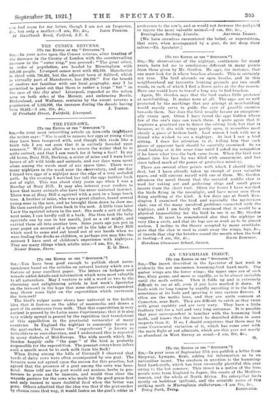[To THE EDITOR OF THE " SPECTATOR ."1 SIR,—You have
been good enough to publish short corre- spondence based on the articles on natural history which are a feature of your excellent paper. The letters on badgers and weasels added details and informatioh which were most valuable to all naturalists. May I venture to add a word or two to the charming and enlightening article in last week's Spectator on the fern-owl in the hope that some observant correspondent may throw some light on the superstition which surrounds the fern-owl?
The bird's vulgar name shows hew universal is the foolish idea that it fastens on the udder of maminalia and draws a part of its sustenance from milk. That this superstition is very ancient is proved by its Latin name Caprimulyus; that it is also very widely spread is proved by the repetition (not translation) of this appellation in the provincial vernacular of many countries. In England the nightjar is commonly known as the goat-sucker, in France the " engoulevent " is known as tette-chevre or suce-chevreau, and I understand this is repeated in many dialects of Mid-Europe. The wide mouth which Mr. Gordon happily calls " the gape " of the bird is probably responsible for the superstition. The peasant everywhere infers such a mouth must be to suck milk from his flock!
When living among the hills of Cornwall I observed that herds of dairy cows were often accompanied by one goat. The farmers were not agreed upon the reason for this practice, but agreed that the presence of a goat among the cows was bene- ficial. Some told me the goat would eat noxious herbs in pre- ference to grass and be immune, and would thus clear the wayside pasture for the cows who made for the good grass first and Only turned to more doubtful food when the better was gone. Others admitted that the idea was that if the goat-sucker by chance came that way, it would fasten on the goat's udder in preference to the cow's, and so would not decrease the pail-yield or injure the more valuable animal.—I am, Sir, &c., [We have ourselves encountered the belief, or superstition, that cows, when accompanied by a goat, do not drop their calves.—ED. Spectator.]


































 Previous page
Previous page